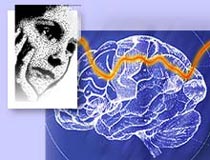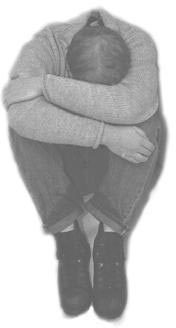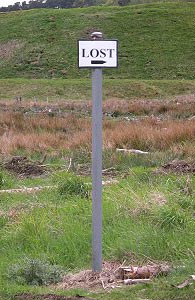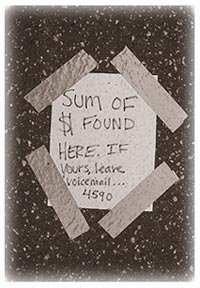| (insert your NIE or newspaper logo here) |
Weekly Online LessonOnline Lesson ArchiveGrade Level: 9-12
|
Lost and Found
 For
many, the holiday season and New Year kindles joy and boosts hope and
humanity.
For
many, the holiday season and New Year kindles joy and boosts hope and
humanity.
But in January, after the gift wrap gets ripped and the parties end, life reverts to routine—or seems to sink even lower—and depression can really hit people.
For teens, feeling blue or even completely hopeless may dominate feelings no matter what the time of year. Government statistics released Thursday, December 29, 2005, conclude that one out of every 10 American teenagers—about 2.2 million—experienced major depression during 2004. The study also noted that depressed youths were more likely to smoke, drink alcohol or abuse drugs, further worsening a teen's ability to deal with things.
Sometimes, depression is brought on by a loss of something, like a family member, a friendship, a certain achievement, or perhaps the simplicity of childhood. Sometimes, we just feel lost—or want to be lost.
In most cases, major depression does eventually pass as a teenager ages, body chemistry stabilizes, and adulthood becomes more comfortable. For some, working through confusing or hopeless feelings by writing or through other forms of expression helps get through the process. For others, conditions may warrant medical treatment.
For this week's lesson, you're going to find out what exactly depression is and what factors can cause it. You'll also become virtually lost, but you may end up finding new things about yourself in the process.
What is depression?
 First,
take
a look at Depression at
the TeensHealth site.
First,
take
a look at Depression at
the TeensHealth site.
Read about how Lindsay has been feeling lately, and then click the Start button to take the short quiz.
[Note: the site's statistics are a bit out of date.]
When you're done with the quiz, continue reading the article to learn about How People Respond to Someone Who's Depressed and Why People Get Depressed.
What are some of the factors that can make a person feel depressed? Which of those are within a person's control and which are not?
What role can self-esteem play? Why can alcohol and drugs make matters worse?
Keep reading the article to discover What Happens in the Brain When Someone is Depressed. What role do the neurotransmitters play?
What are the four Types of Depression? In what ways are they different from each other?
What Are the Symptoms of Depression? Do you or does someone you know show five or more of these signs? How can these symptoms interfere with everyday life?
How can depression deepen? What factors can make recovery difficult? What are the best ways for Getting Help? What steps would you take to help a friend who might be suffering from depression?
Before leaving the TeenHealth site, see More Articles Like This. Choose one or more articles to read, like the one about Body Image Problems, Cutting, or Talking with Your Parents - or Other Adults.
Make a list of five things you worry about the most, and then write a couple of sentences describing how each one makes you feel and why you think it makes you feel that way. Also, describe how you cope with those feelings.
Alternatively, think about a time when you felt the saddest. What factors or events seemed to make you feel like that? Did anything or anyone help you to feel better or resolve the situation?
Get Virtually Lost & Found
 Depression
can make a person feel lost and alone. In reality, everyone at some
point in his or her life experiences a loss of one sort or another.
Depression
can make a person feel lost and alone. In reality, everyone at some
point in his or her life experiences a loss of one sort or another.
But by exploring loss—and the different meanings of being lost—one can also find new things to feel hopeful about.
So what does it mean to get lost or to lose something? To find out, begin your quest by getting Virtually Lost.
Read About being lost, and then Enter Website. Click on the eye followed by the center of the eye to Enter site.
Start getting lost by clicking on the man sitting to the far left. Click on the sign he is holding to see the V-lost screen. Click Search, and then click the Search result, Where's Robbie card game. Here, Robbie is lost in a pack of cards, he gets shuffled, and you have to find him.
When you've found him, go Back and Exit.
Now, click on the guy sitting in the middle.
As you'll see, his card defines lost as confused, bewildered, or helpless.
Click Next to open the book and browse the contents:
- Lost on Nothing
- Lost on Nobody
- Lost Sayings
- Lost I Am
- Forgotten Name
- Forgotten Man
- Lost Childhood
How does each set of prose compare in how they approach or illustrate the idea of being lost? What exactly was "lost"? Was anything "found"? When can losing something result in positive consequences? In what way does each section say something about life or living?
 Hit the Exit, and visit with the last guy on the bench. Here,
you're faced with another definition: unable to find one's way or uncertain
of one's whereabouts.
Hit the Exit, and visit with the last guy on the bench. Here,
you're faced with another definition: unable to find one's way or uncertain
of one's whereabouts.
Click Next to Choose a path.
As you'll discover, sometimes a path can lead to a Dead End; if you Work Hard, you may find you have lost work time.
Falling in Love may be an easier path than one realizes; Pushing your barriers may be just the right move you need; and, by Meeting People we are virtually never really lost.
Now it's your turn. Write down music lyrics or phrases people use when talking about being lost or losing something. You can also brainstorm things you've lost in your life—whether the loss was a positive or negative experience. Also, think about the list you made earlier. Do any items relate to a type of loss?
Do a similar brainstorm about finding things. This might include "finding" a new personal strength, friendship or opportunity, or it might be something like finding your car keys when you're in a rush.
After reviewing your lists, pick a topic from each list that relate to one other in some way. Write an essay or poem describing how they have affected you.
Newspaper Activities
Browse current issues of The Salt Lake Tribune. Carefully read news and feature articles, looking for people who have experienced some sort of loss and how it has affected them emotionally, physically, legally, financially, or whatever the case may be. Think about what the situation might feel like from his or her point of view. Based on the facts noted in the article, write a creative, first-person narrative from that person's perspective. You should describe what "you" have lost, but also include something that has been "found" during the experience. What factors or conditions could offer hope for life being or getting better in some way? Alternatively, check the Lost and Found Classifieds for ideas.
© Copyright 2006
Learners Online, Inc.
